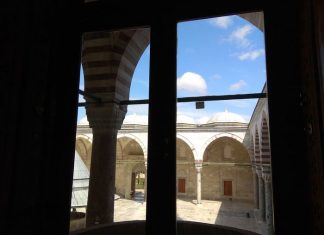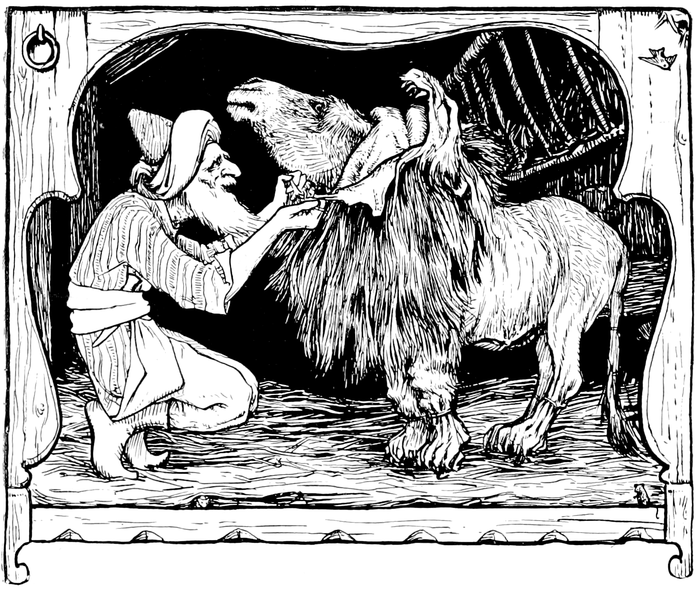“What! going to leave the castle at midnight? Why, everything was prepared for his reception; a chamber was ready for him if he wished to retire.”
The stranger shook his head mournfully and mysteriously: “I must lay my head in a different chamber to-night!”
There was something in this reply, and the tone in which it was uttered, that made the Baron` heart misgive him; but he rallied his forces, and repeated his hospitable entreaties. The stranger shook his head silently, but positively, at every offer; and, waving his farewell to the company, stalked slowly out of the hall. The maiden aunts were absolutely petrified—the bride hung her head, and a tear stole to her eye.
Followed the stranger
The Baron followed the stranger to the great court of the castle, where the black charger stood pawing the earth and snorting with impatience. When they had reached the portal, whose deep archway was dimly lighted by a cresset, the stranger paused, and addressed the Baron in a hollow tone of voice, which the vaulted roof rendered still more sepulchral. “Now that we are alone,” said he, “I will impart to you the reason of my going. I have a solemn, an indispensable engagement”
“Why,” said the Baron, “cannot you send some one in your place?”
“It admits of no substitute—I must attend it in person—I must away to Wurtzburg cathedral—”
“Ay,” said the Baron, plucking up spirit, “but not until to-morrow —to-morrow you shall take your bride there.”
“No! no!” replied the stranger, with tenfold solemnity, “my engagement is with no bride the worms! the worms expect me! I am a dead man I have been slain by robbers my body lies at Wurtzburg at midnight I am to be buried the grave is waiting for me I must keep my appointment!”
He sprang on his black charger, dashed over the drawbridge, and the clattering of his horse` hoofs was lost in the whistling of the night blast.
The Baron returned to the hall in the utmost consternation, and related what had passed. Two ladies fainted outright; others sickened at the idea of having banqueted with a specter. It was the opinion of some that this might be the wild huntsman famous in German legend. Some talked of mountain sprites, of wood-demons, and of other supernatural beings, with which the good people of Germany have been so grievously harassed since time immemorial.
One of the poor relations ventured to suggest that it might be some sportive evasion of the young cavalier, and that the very gloominess of the caprice seemed to accord with so melancholy a personage. This, however, drew on him the indignation of the whole company, and especially of the Baron, who looked upon him as little better than an infidel; so that he was fain to abjure his heresy as speedily as possible, and come into the faith of the true believers.
Read More about Isaac Comnenus 9








